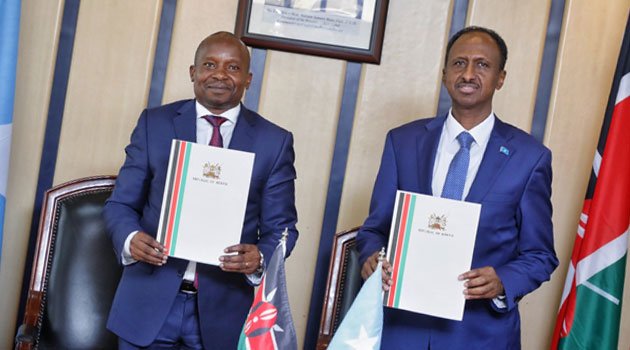
In a move that signals the strengthening of bilateral ties between Kenya and Somalia, officials from both nations have come to an agreement to gradually reopen three border posts over a span of 90 days. These border points, located in the Kenyan counties of Garissa, Mandera, and Lamu, were initially sealed off in 2011 during the presidency of Uhuru Kenyatta, following a surge in attacks by the Al-Shabaab terrorist group based in Somalia, known to be an affiliate of Al-Qaeda.
Kithure Kindiki, the Interior Cabinet Secretary of Kenya, announced this development at a joint media briefing held on Monday, alongside his Somali counterpart, Mohamed Sheikh Ali. Kindiki emphasized the reopening of the border posts is a significant step towards bolstering cross-border cooperation and enhancing the bilateral relationship between Kenya and Somalia.
The process of reopening will commence with the Mandera-Bula Hawa border point, set to be accessible after 30 days. Following this, the Liboi-Harhar-Dhobley border on the Somali side and the Kiunga-Ras Kamboni border point in Lamu will be reopened within the subsequent 60 days.
“The Mandera-Bula Hawa border serves as an entry point from the Kenyan side in Mandera County, the Liboi-Harhar-Dhobley border on the Somali side in Garissa County, and the Kiunga-Ras Kamboni in Lamu County,” Kindiki explained. His statement came after a high-level meeting attended by Somalia’s Minister for Defence, Abdulkadir Mohamed Nur, the Minister for Foreign Affairs, Abshir Omar Jama, and Kenya’s Defence Cabinet Secretary, Aden Duale.
Kindiki acknowledged the persistent security threats originating from the Al-Shabaab terrorist group that both Kenya and Somalia continue to face, particularly in regions along the shared border. He emphasized the necessity for both nations to intensify their efforts to counteract violent extremism, considering the threat it poses to national and regional peace and stability.
“The discussions underscored the urgency to fortify cooperation and partnership between our two neighbouring countries to address these challenges and promote regional integration,” Kindiki asserted. He acknowledged the invaluable contribution of development partners in combatting terrorism, violent extremism, cross-border organized crime, and in augmenting efforts to maintain peace and security in the region.
The Interior CS affirmed Kenya’s commitment to strengthening cross-border engagements, considering the evolving security trends and dynamic paradigms that exceed national, regional, and continental boundaries.
Kindiki further highlighted that both countries have resolved to fortify cross-border communication and information sharing, improve border infrastructure and management, and devise strategies to address cross-border issues.
Somalia’s Internal Security Minister, Mohamed Ahmed Sheikh Ali, identified the myriad challenges experienced by communities on both sides of the border. These include recurrent droughts, human trafficking, illegal trade, and transnational crimes, which he deemed too complex for a single country to handle.
“However, by working collaboratively and capitalizing on our historical and bilateral ties, citizens of both Somalia and Kenya can benefit from enhanced food security, improved infrastructure, increased exchange of goods and services, and overall sustainable, long-lasting peace,” Ali stated. He also confirmed Somalia’s commitment to cooperating with development partners to bolster cross-border security and cooperation.



















